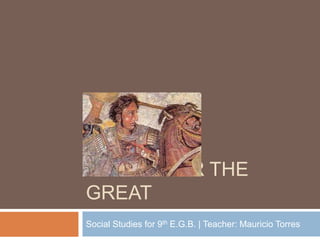
Alexander the Great's Conquests
- 1. ALEXANDER THE GREAT Social Studies for 9th E.G.B. | Teacher: Mauricio Torres
- 2. Phillip II When Athens finally decided to take action against a threat that came from the north, it was already too late. Athens and other Greek city- states had lost their independence to Macedonia’s king Phillip II. Yet this disaster ushered in a new age in which Greek influence spread from the Mediterranean to the borders of India, this was the work of his son, Alexander the Great.
- 3. Macedonia To the Greeks, the rugged mountainous kingdom of Macedonia was a backward, half- civilized land. Their rulers in fact, were of Greek origin. Phillip had lived in Thebes and had come to admired Greek culture. He even hired Aristotle to be his son’s tutor.
- 4. Phillip’s Dream When Phillip gained the throne in 359 BC he began conquering and allying with other Greek city-states. By 338 BC, he was finally able to conquer the allied Thebes and Athens, bringing almost of all of Greece entirely, under his rule. He had proven himself to be the greatest commander of his era. His grander dream was to conquer Persia, but he was not able to do so, because he was murdered , under very shady circumstances, during his daughter’s wedding. He was succeeded by one of his sons, Alexander.
- 5. Conquest of Persia Alexander was only 20 years old when he came to the throne, yet he was already and experienced soldier that shared his father’s ambitions. By 334, with all of Greece under his control, he crossed the Dardanelles into Asia Minor to begin the conquest of Persia. The Persian Empire was weaker, torn apart by internal rebellions, but it still proved to be a formidable foe.
- 6. Conquest of Persia Alexander won his first victory against the Persians at Granicus. Then victory to victory he moved on from Asia Minor into Palestine and south to Egypt. In 331 BC, he moved to conquer Babylon. After that he captured other Persian capitals, and before he could capture Darius III, the Persian emperor, he was
- 7. Onward to India After conquering the Persian Empire, Alexander chose to cross the Hindu Kush mountains (modern day Afghanistan) into the Indus valley. It was a formidable feat, even to this day. There, in 326 BC, his army faced war elephants for the first time ever. Although he never lost a battle, his soldiers were tired and wanted to return home. Reluctantly, they turned back to Babylon.
- 8. Sudden Death Before he could set out again, Alexander fell victim to a sudden fever. As he lay dying, his commanders asked him, to whom he left the empire. His reply was: “To the strongest”. No one proved strong enough and his vast empire was split into three parts.
- 9. Small Facts I From his tutor, Aristotle, young Alexander acquired a love of learning and the arts, but he was first and foremost a warrior. When Thebes rebelled, he ordered the city to be burned to the ground and its inhabitants killed or enslaved. But he told his soldiers to spare the house where the Greek poet Pindar had once lived.
- 10. Small Facts II Alexander had a favorite horse named Bucephalus. According to a historian, Alexander was 12 years old when he won the horse. No one could tame the animal, but Alexander wanted to try. He promised to pay for the horse if he failed. Alexander succeeded by turning the horse towards the sun, so it couldn’t see its own shadow, which was frightening it. He loved the animal so much, that when Bucephalus died, Alexander named a city – Bucephala – after the animal.
- 11. Small Facts III A brilliant commander, he never lost a battle. He inherited his father’s abilities, mastered them and improved them. Phillip had improved the phalanx by adding the sarissa, which was a longer spear that could be used as a dissuasive weapon.
- 12. Alexander’s Character By reading the three “Small Facts”, what can you tell from Alexander’s character? List down at least three attributes of his persona.
- 13. Bibliography Ellis, E. G., & Esler, A. (2009). World History. (P. Hall, Ed.) Upper Saddle River, New Jersey, US: Pearson Education INC. Burstein, S. M., & Shek, R. (2012). World History (Teacher´s Edition) (1st Edition ed.). (H. McDougal, Ed.) Orlando, Florida, US.: Houghton Mifflin Harcourt Publishing Company. Images taken from Google.